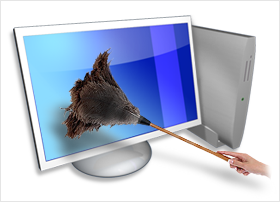How to Spring Clean Your MachineMost of us take the time to spring clean our houses each year, so why not your computer? Getting rid of old files and programs that you don't need anymore can help your machine run faster and more efficiently, allowing you to be more productive. Archiving files that contain personal information can also improve your security since reducing the amount of personal information you store on your computer reduces the risk that it will fall into the wrong hands.
The good news is it doesn't take that much time or effort to give your computer a good spring cleaning. Start by emptying your trash, since these files are still taking up valuable space on your hard drive, and then follow these tips for a cleaner and faster machine:
•
Remove old programs — Remember that game you played once or the photo software you never used? If you have programs that you haven't used for at least a year, it is time to get rid of them. If you are a Windows user, this is also a good time to look at the number of icons on your taskbar, since they launch at startup and could slow down your machine.
•
Get rid of clutter and backup important files — If you're like most of us, you probably have files littering your desktop and folders that you don't really need. Delete the files that aren't important to you and organize the files that you want to save into clearly labeled, easy-to-find folders. Then, back up all the files remaining on your computer so you can restore them in case something goes awry. If you have files you want to get rid of that contain sensitive information you might consider the McAfee® Shredder™ tool which allows you to permanently delete items from your PC. It is so effective, even the U.S. government uses it.
•
Defrag your computer — This sounds technical but it's actually quite easy to do. Defrag stands for defragmentation, and it is basically the process of storing the data on your computer in a more efficient way so it runs faster. If you have a Windows machine, look under programs for “disk defragmentation” to start the process. If you have a Mac running OS X, you don’t need to worry because the computer will optimize itself after installing new applications or system updates. If you’re running a different operating system, look online for detailed instructions and information on defrag programs.
•
Upgrade your operating system — You'll get the best performance from your system if your software is up-to-date. Upgrades usually offer new features that can help your machine run smoothly. It's also a good idea to install these upgrades because they often include security patches that help keep your computer protected from the latest threats.
•
Clear your cache — Your browser saves recently used elements from the webpages you visit, so that they can be accessed quickly when you revisit a page. Clearing your browser's cache of temporary files and cookies can free up a lot of space on your hard drive. To clear your cache, go into your browser's Internet options or privacy menu and delete your browsing history. Check online for specific instructions on how to clean your browser's cache.



